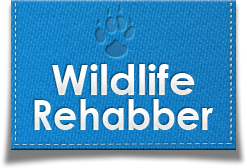If you find a baby squirrel
When you first encounter an orphaned mammals, it is critical to ensure two things before deciding what action to take. First, is it injured or physically compromised. Next, is it truly orphaned?
First, screen the baby to see if it is injured or physically compromised. Please use every precaution to ensure your personal safety.
- Is it injured? Any evidence of blood in any amount, any signs of torn or punctured skin, breathing heavily, sitting or laying in an awkward position, arms/legs extended unusually, etc.
- Is it cold? They should feel very warm to the touch.
- Does it’s abdomen and eyes appear sunken-in? They should have bright round eyes and enormous pot-bellies.
- Is it lethargic, inactive, keeps its eyes closed most of the time, prefers to sleep, or is uninterested in it’s surroundings?
- Was it handled by a dog or cat/did you find it near a dog or cat?
- Is it in imminent danger (from children, pets, predators, traffic)?
- Are there dead siblings/parents near-by?
- Are there flies or ants around the baby?
- Possible fractures? When you gently extend arms and legs, the baby should be able to easily pull them back into proper position.
If you answered yes to any of these questions, please contact a Wildlife Rehabilitator immediately by phone. Medical intervention will most likely be needed. Please do not rely on email because most rehabilitators do not routinely access their computers. Visit Emergency Care for stabilization information until you can transport to a rehabilitator.
Is it really orphaned?
- Squirrels have litters of 3-5 babies. If you find a single baby, please take time to look for its siblings. When young, they generally do not crawl too far from where they have fallen, and may take shelter under grasses or leaves.
- Unless she has been killed or injured, mom will come looking for her babies. Place the babies in a lined, open box at the base of the tree they fell from. Depending on the weather, you may want to provide a toweled hot water bottle for heat. Mom should retrieve each baby within 1-2 hours. If the nest was damaged, mom will first build a new one, then carry her babies to it. Mom will not retrieve the babies if they are too cold, if there is too much pet or human activity near the babies, or if they are too far from their original nest location.
- If a renest has been unsuccessful or the baby’s condition deteriorates, please contact a Wildlife Rehabilitator immediately by phone. Medical intervention will most likely be needed. Please do not rely on email because most rehabilitators do not routinely access their computers. Visit Emergency Care for stabilization information until you can transport to a rehabilitator.
